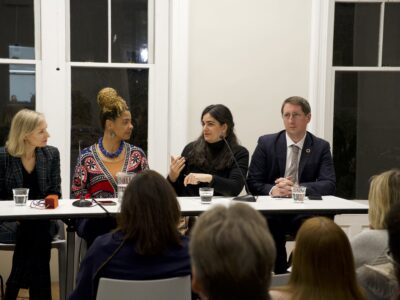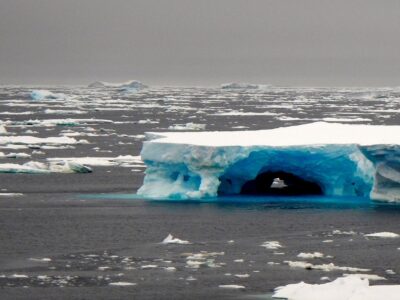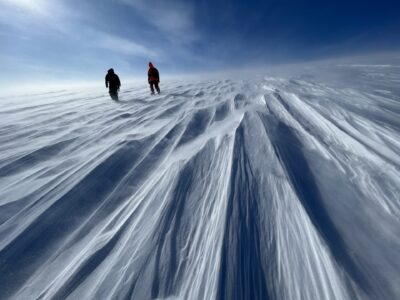
Convinced that science should be the basis for major decision and policy making, Jeffrey Fralick spends his time researching how to better address climate challenges.
Before joining Columbia’s M.S. in Sustainability Science program, Fralick graduated from Cornell University. In the past, he has conducted research on water quality of streams and rivers across the Delaware-River Watershed, helped to organize a state-wide environmental lobby day at the Pennsylvania capital, and served as a research assistant for Steven Cohen, director of the Earth Institute’s Research Program on Sustainability Policy and Management. He was attracted to the Sustainability Science program because he wanted to expand upon his knowledge of environmental and sustainability science in order to better understand how to address and respond to the many threats of climate change. He enrolled in Fall 2018.
Currently, Jeff is a student assistant at the New York State Office of the Attorney General in the Environmental Protection Bureau and was most recently a faculty support assistant for Professor Lynnette Widder’s Hungry City Workshop.
What drew you to the M.S. in Sustainability Science?
For as long as I can remember, I have always been obsessed with the weather. I was born in Missouri and lived in Kansas for the first couple years of my life, which is where I think I caught the weather ‘bug’ after experiencing such intense thunderstorms at an early age. When my family and I moved to Pennsylvania in 1999, we were welcomed by Hurricane Floyd, my first brush with a tropical cyclone, that knocked out our power for several days. Throughout middle school, I was known as “Hurricane Jeffy” because I became the go-to person for local weather forecasts.
Flash forward many years and countless other weather events — my first nor’easter, the first-time I experienced thundersnow, Hurricanes Katrina, Irene, and Sandy, etc. — I entered Cornell University as an Atmospheric Science major in hopes of becoming a broadcast meteorologist.
During my first couple of semesters there, I started to learn more and more about the science behind climate change and the wide-variety of impacts — economic, environmental, social, etc. — associated with rising carbon dioxide levels and resultant planetary warming. In my junior year, I changed my major to Environmental and Sustainability Science in order to get a more holistic view of the climate change problem that went beyond the science component, especially since science thus far has largely been unable to spur the proper societal reaction to combat the problem. The phrase ‘climate change’ evokes different connotations these days, and there are so many compounding factors that make it such a complex problem to address.
I was attracted to the Sustainability Science program because I wanted to learn more about how we — both as individuals and as a society — can incorporate more sustainable practices in our day-to-day lives, and how to better adapt to and mitigate the effects of climate change. Additionally, I personally want to be well-versed in the broader field of sustainability, so that I can make as large of an impact as possible in whatever position I find myself in post-graduation.
What do you intend to do professionally once you achieve your degree?
There are so many different career avenues related to ‘sustainability’ that can be explored, especially as consumers expect companies to incorporate sustainability into their business practices. I haven’t ruled out any such avenue, but I would love to do something where I could ultimately combine my passions for atmospheric and environmental science to make an impact. One day, I could see myself working for the National Oceanic and Atmospheric Administration (NOAA) or the Environmental Protection Agency (EPA). My current work experience with the New York State Office of the Attorney General in the Environmental Protection Bureau has bolstered my faith in the value of science in the formulation of environmental law, and I would love to continue to conduct research that can ultimately help protect the environment and the broader commons that we all share.
What do you think is the most important sustainability challenge?
This is a difficult question, as there are currently so many sustainability challenges across the globe. Additionally, the majority of these ‘challenges’ are intrinsically related to climate change — that is, cutting greenhouse gas emissions to alleviate climate change would also help address several sustainability challenges. For example, one sustainability challenge that the world is already facing and will continue to have to handle is the mass-migration of coastal communities that can no longer occupy such regions due to rising sea levels. How will cities that are already largely at carrying capacity ‘sustainably’ undergo urbanization to accommodate this influx of people? How will runoff rates respond to the expansion of impervious surfaces? Would public transportation options need to expand to ensure all those encompassed within the city’s sprawl have equitable access? These are difficult questions — but, slowing the rate at which sea levels rise by reducing greenhouse gas emissions could help slow the rate at which communities are misplaced, and allow for more time to formulate answers to those tough questions.
If I had to pick the most important sustainability challenge, though, I would say that feeding a rapidly growing population on agricultural land where climate change alters the duration of droughts, flooding, and other weather extremes is one of the more pressing matters, especially as millions and millions of people in the U.S. and across the globe already struggle to access nutritious meals on a daily basis. When thinking about sustainability challenges of the future, current problems can’t be overlooked.
What skills and tools have you acquired through the program so far?
I have learned how to use various computer programs, such as MATLAB, Python, and ArcMap, that ultimately help to analyze and illustrate a wide-variety of environmental problems. For example, in my Climate Models for Decision-Makers course, we learned how to use data from global climate models to calculate and map changes in average global temperatures. In GIS for Sustainability Science, we learned how to use GIS software to produce compelling maps and analyze data with a geospatial component. For example, one lab was designed to calculate the amount of people impacted by various levels of storm surge inundation across the five boroughs of New York City. In Observing and Understanding Sea Level Change, we used MATLAB to calculate trends in sea level change. This is just a selection of skills acquired through the program thus far, all of which I am sure will be useful in my career going forward, especially in the realm of environmental policy.
How have you applied what you’ve learned in the program so far?
I have already been able to use GIS at my current job and often now find myself approaching new problems by first determining if there is a geospatial component of the data. Maps are particularly powerful tools that can illustrate a story or problem far better than words, so I am very thankful that I was able to learn how to utilize this software to tell more ‘compelling’ stories with data, if you will. Furthermore, I find myself able to more eloquently explain certain climate change– and sustainability–related challenges to friends and family, and feel confident in engaging in discussions with those who may or may not agree with me, both in-and-out of the classroom.
Beyond the classroom, what sustainability-related extracurricular have you engaged in with your fellow Sustainability Science students?
I think one of the aspects that makes the SUSC program so unique is our relatively small cohort size. As such, we are able to do a lot more activities together. While not necessarily directly related to sustainability, one of my favorite SUSC activities was when we ventured down to near Coney Island to count and tag horseshoe crabs with NYC Parks and Rec. We have also gone to see sustainability-related films, including the premiere of Anthropocene: The Human Epoch. Thanks to Kevin Webb, the creation of our student group, RESCUE [Resiliency Science Union of Excellence], has not only expanded our reach on campus but also allows for more frequent opportunities to convene and discuss all-things ‘sustainability.’ I was also able to put my research abilities to the test by joining a SUMA Net Impact project team last spring, where our client was interested in growing industrial hemp on a small island in the Caribbean. That was an awesome experience in consulting and perhaps the biggest positive to come out of that whole project is the friendships that formed amongst the group.
What is your favorite class in the SUSC program and why?
My favorite class in the SUSC program thus far has to be Environmental Sustainability Indicators: Construction and Use. Before the class, I was relatively unfamiliar with the concept of indicators and how they can be used in the construction of aggregated indices that can combine a wide range of economic, environmental, and social parameters to create one complete ‘index’ for scoring and comparison purposes. Our final project was to develop our own index that could assess an environmental problem of our choosing.
Friends, family, and cohort members who have ever taken a class with me know about my passion for the Clean Water Act and ‘waters of the United States,’ so I wanted to develop an index that could provide a more holistic look into water quality to determine areas where environmental regulations were clearly not doing enough to protect water quality.
I chose to develop a water quality index that was built upon four pillars — chemical, physical, metals, and nutrients — and contained 16 indicators. The project took a ton of work, pushed me into learning how to use R-software to conduct a multivariate analyses, and included the creation of 17 different Excel spreadsheets, but it was incredibly rewarding to actually produce scores and rank bodies of water using something that you had developed in an area that is important to you.
How do you intend to utilize your degree from the SUSC program to further your career?
I am most excited about being able to utilize all of the skills I have learned throughout my time in the program in a career where such skills and knowledge can hopefully create a positive impact to society, whether through formulating environmental policies, drafting sustainability reports, etc. As I enter my last semester, I look forward to the capstone project to serve as the culmination of what I have learned and believe it will help with the transition into a more-permanent career once the program is over.
How has collaborating with your fellow students in projects in the classroom benefited you professionally and/or personally?
Group work often goes one of two ways — smoothly, or not so smoothly. However, both ways are important for personal and professional growth, as there will always be times where you are forced to collaborate or interact with someone who you may or may not agree with, but must work together to deliver a product. I have been very lucky in the classroom thus far in terms of collaborations. The SUSC cohort encompasses a wide array of backgrounds, making collaborations in the classroom interesting, as projects can often be tackled from different angles that an individual is unable to bring on their own. For as much as I learn from the program’s professors, I learn just as much from collaborations with my fellow SUSC students.
What do you think is the most beneficial aspect of the SUSC program with regard to your career?
Being able to access and form connections with researchers within the Earth Institute and at Lamont-Doherty Earth Observatory is one of the most beneficial aspects of the SUSC program. To learn from some of the leading experts in their respective fields is nothing short of inspiring. In a world where science has come under fire, it is reassuring to know and see that there are researchers who have dedicated their careers to solving some of the most important sustainability challenges of our time. Bringing this same type of commitment and dedication to the pursuit of scientific knowledge will result in a rewarding career path going forward.
Ofelia Mariana Lopez is a student in the M.S. in Sustainability Management program at Columbia University.
The M.S. in Sustainability Science, co-sponsored by the Earth Institute and Columbia’s School of Professional Studies, focuses on the scientific methods and tools that can be used to observe, monitor, and respond to environmental impacts. Visit our website to learn more.




I look forward to hearing what you do next Jeff!